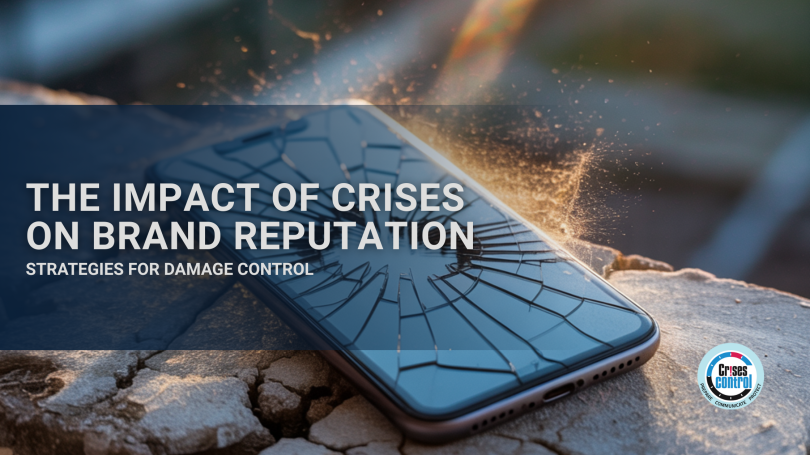In the ever-changing business landscape, crises can strike at any moment, threatening to unravel everything you’ve worked so hard to build. From sudden disasters to reputation-damaging incidents, the stakes are high, and the pressure is on to have a plan in place for crisis control. Discover how to shield your brand reputation, bounce back from adversity, and emerge stronger than ever. From crisis-specific planning to harnessing the latest technology, we have the tools you need to protect your business and its future. Get ready to take control and safeguard your success.
Understanding the Importance of Brand Reputation
The Significance of Brand Reputation
Brand reputation is the perception and trust that consumers, stakeholders, and the general public have in a company. It takes years to build a positive reputation, but a crisis can erode it within minutes. The consequences of a damaged brand reputation can be severe, leading to lost customers, diminished investor confidence, and long-term financial repercussions.
The Role of Crises in Shaping Brand Reputation
Crises have a unique ability to test a company’s resilience and expose its vulnerabilities. How an organisation handles a crisis can significantly impact its brand reputation. Effective crisis management can demonstrate transparency, accountability, and a commitment to resolve the situation, helping to mitigate the damage and maintain stakeholder trust.
Strategies for Effective Crisis Control
Preparing for Crises with Technology
Utilising technology solutions, such as Crises Control, can empower organisations to proactively manage and mitigate crises. These software platforms offer comprehensive crisis management features, including real-time communication, incident reporting, and resource coordination. By leveraging such tools, businesses in various industries, including construction, infrastructure, hospitality, and property management, can enhance their crisis response capabilities and protect their brand reputation.
Crisis-Specific Planning and Training
One of the key elements of effective crisis management is developing crisis-specific plans and providing training to relevant personnel. These plans should outline clear protocols for different crisis scenarios, including communication channels, decision-making processes, and stakeholder engagement strategies. By ensuring that employees are well-prepared and equipped with the necessary knowledge and skills, organisations can respond to crises swiftly and effectively.
Collaborative Stakeholder Engagement
During a crisis, collaborating with stakeholders is crucial for managing the impact on brand reputation. Engaging with customers, employees, suppliers, and the local community in a transparent and empathetic manner can help mitigate potential damage. Open lines of communication, regular updates, and addressing concerns promptly can foster trust and demonstrate a commitment to resolving the situation.
Media Relations and Messaging
Engaging with the media strategically is vital to control the narrative during a crisis. Establishing relationships with journalists and providing accurate and timely information can help shape public perception and mitigate reputational damage. Crafting key messages that align with the organisation’s values, emphasising transparency and accountability, can bolster stakeholder confidence and minimise the negative impact on brand reputation.
Continuous Monitoring and Evaluation
Effective damage control requires ongoing monitoring and evaluation of crisis response efforts. Organisations should assess the effectiveness of their strategies, identify areas for improvement, and make necessary adjustments. By learning from past crises and implementing lessons learned, businesses can enhance their resilience and better protect their brand reputation in the future.
The Role of Technology in Crisis Management
Leveraging Technology for Real-time Communication
In today’s digital age, technology plays a crucial role in crisis management. Platforms like Crises Control provide real-time communication capabilities, enabling organisations to disseminate accurate information quickly. Organisations can reach stakeholders across multiple channels by utilising features such as mass notifications, ensuring timely updates and reducing misinformation.
Streamlining Incident Reporting and Response
Technology solutions facilitate the streamlining of incident reporting and response processes. With tools like Crises Control, employees can easily report incidents, and designated teams can swiftly assess and respond. This streamlined approach minimises response times and allows organisations to take immediate action to mitigate the impact of crises on brand reputation.
The Importance of Business Continuity Planning
Business Continuity Planning for Resilience
Business continuity planning is a crucial aspect of effective crisis management. By developing and implementing business continuity plans, organisations can ensure that critical operations continue even during times of crisis. This preparedness enables companies to maintain their brand reputation, serve their customers, and minimise the disruption caused by crises.
Conclusion
In conclusion, the impact of crises on brand reputation cannot be underestimated. However, by implementing proactive strategies, leveraging technology solutions like Crises Control, emphasising stakeholder engagement, and incorporating business continuity planning, organisations can effectively navigate these challenges. Preparing for crises, developing crisis-specific plans, managing media relations, continuously evaluating responses, and maintaining business continuity are critical components of successful damage control. By prioritising the protection of their brand reputation, businesses can safeguard their long-term success and build trust with their stakeholders.
Are you ready to protect your brand reputation in the face of crises? Take charge of your organisation’s resilience with Crises Control. Our comprehensive crisis management solution empowers you to proactively respond to crises, streamline communication, and safeguard your brand reputation. Request a live demo or get in touch with our experts today to see how Crises Control can benefit your organisation. Don’t wait until it’s too late – take control now and ensure the safety and reputation of your business.







